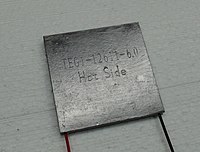
Photo from wikipedia
Abstract In this study, polyaniline functionalized graphene quantum dots composite with excellent performance was successfully prepared by situ polymerized, and it was applied to fabricate electrochemical sensor for analysis of… Click to show full abstract
Abstract In this study, polyaniline functionalized graphene quantum dots composite with excellent performance was successfully prepared by situ polymerized, and it was applied to fabricate electrochemical sensor for analysis of calycosin in the complex samples of traditional Chinese medicine. The polyaniline functionalized graphene quantum dots composite was characterized by Fourier transform infrared spectroscopy and Raman analysis, to indicate that polyaniline functionalized graphene quantum dots composite was successfully synthesized. The morphology and microstructure of the modified electrodes were characterized by Scanning electron microscope and Transmission electron microscope. According to the results of cyclic voltammetry and electrochemical impedance spectroscope, the glassy carbon electrode modified with polyaniline functionalized graphene quantum dots composite significantly increased the electron transfer rate on the surface of sensor. Under the optimized conditions, the fabricated sensor was used for the analysis of calycosin in Radix Hedysari and Radix Astragali by differential pulse voltammetry, which displayed acceptable reproducibility, long-term stability, good selectivity and sensitivity. The proposed sensor exhibited a wide detection range (1.1 × 10−5–3.52 × 10−4 mol/L) with a detection limit of 9.8 × 10−6 mol/L (S/N = 3). This study provided a novel and convenient method for rapid evaluation of the quality of Radix Hedysari and Radix Astragali.
Journal Title: Journal of Electroanalytical Chemistry
Year Published: 2018
Link to full text (if available)
Share on Social Media: Sign Up to like & get
recommendations!